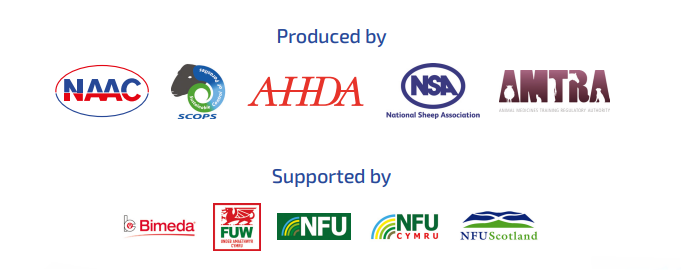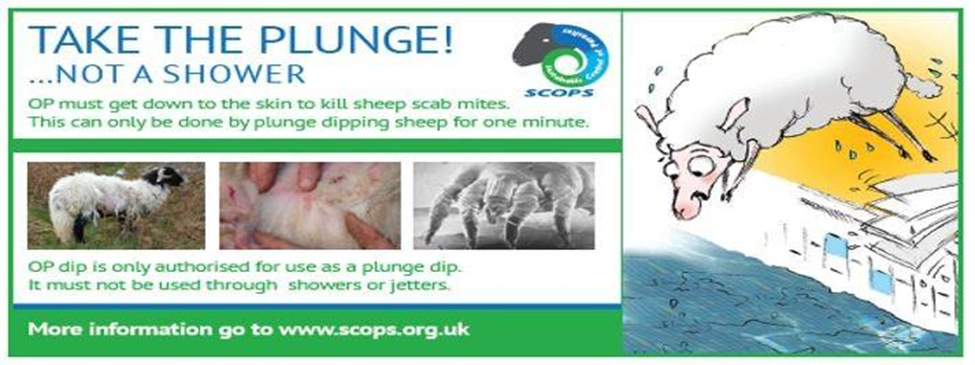News from AMTRA
AMTRA supports new Mobile Sheep Dipping Code of Practice
Industry stakeholders have been working to reduce pressure on injectable MLs for treatment of sheep scab and thus help preserve their efficacy and reduce the development of resistance. Increasing the treatment and prevention of scab with OP dips has an important role in doing that.
In practice, many farms do not have facilities up to required standards to be able to use OP dips, or lack permissions to dispose of the spent dip wash, or the farmer doesn't have the required Certificate of Competence.
As a result, the use of mobile contract dippers is important in facilitating increased use of OPs to take the pressure off the MLs.
AMTRA has been active in contributing to development of a new Mobile Sheep Dipping Code of Practice. This Code is aimed at all involved in the process: the contractors themselves, prescribers, and farmers.

RAMAs/SQPs will know that there has been a lack of clarity on how exactly to handle prescription and supply of OP when contractors are involved: neither the Veterinary Medicines Regulations nor the SQP Code of Practice were written with this unique market segment in mind. The new Mobile Sheep Dipping Code addresses that uncertainty and provides clarity as to what is expected of prescribers, and what is expected of contractors who wish to take advantage of the additional freedoms use of this Code provides for them.
AMTRA expects that any RAMA/SQP on its Register who is supplying OP dips via a contractor who wishes to obtain supplies in advance for a number of farms should follow this Code. Where a prescriber or contractor chooses not to follow this Code, then the normal provisions in the Veterinary Medicines Regulations and SQP Code of Practice apply, and prescription/supply should be direct to the farmer, and not via a contractor.
The new Code now gives clear rules for what prescribers are permitted to do (and what not), and in what circumstances. The Code also sets out clear responsibilities for contractors, in their role as an intermediary between the prescriber and the farmer.
The VMD have backed the Code which ensures among other things that withdrawal periods are noted and observed as well as requiring the contractor to have a conversation with the farmer to pass on information from the prescriber about things such as handling after dipping, and for the contractor and farmer to agree and arrange for responsible disposal of spent dip wash. The contractor also has duties in respect of checking the health of the sheep that would normally be the subject of discussion between the prescriber and farmer.
It is important to be aware of the unique situation when prescribing sheep dip. The product is prescribed to the individual farmers but is supplied via the contract dipper. The contract dipper is thus the conduit of product AND information given at the time of prescribing by the prescriber to the farmer.
The Code holds each stakeholder; farmer, prescriber and dipper all equally responsible.
The revised Code was launched earlier this month. The update has been the culmination of a significant group effort between industry stakeholders. The Code makes provision for supply of up to 7 consecutive days of dip in advance to a contract dipper provided ALL the requirements are met by the contactor and for the prescriber to prescribe appropriately and responsibly.
The Mobile Sheep Dipping Code of Practice can be downloaded from the AMTRA website.
AMTRA RAMAs involved in prescribing OP dip must familiarise themselves with this and in particular with the following part of the Mobile Sheep Dipping Code of Practice:
Prescribing, Supplying, Purchasing and Storing OP Dip
- Evidence must be provided to the prescriber that a Certificate of Competence (NPTC Level 2 Award in the Safe Use of Sheep Dip) is held by the person buying dip. This includes a contractor collecting dip on behalf of an individual customer.
- The prescriber must make a record of that person’s certificate number as soon as is reasonably practicable and keep it for at least three years, according to the Veterinary Medicines Regulations 2013.
- The contractor must sign a document with each prescription to confirm that the latest version of this Code will be complied with in its entirety. A copy of the signed document must be retained by the prescriber.
- A contractor can legally purchase and store OP dip, that is intended for up to 7 days of continuous dipping, provided the dip has been properly prescribed* for each farm and it is then stored in accordance with the conditions stated in the relevant regional guidance or legislation under point 10. The information contained in Appendix 3 should be completed by the contract dipper and be given to the prescriber, every time a prescription is required.
* Legally, the responsibility falls to the person carrying out the “supply” duties. In practice, this is almost always the Prescriber. In the very rare instances where the person prescribing is not the person “supplying” as in the Veterinary Medicines Regulations, then the legal duty falls on the supplier, but it is recommended that the prescriber fulfils these duties too.
Appendix 3 on page 9 and 10 of the Code is the form which the prescriber/AMTRA RAMA must obtain or use with the contractor when supplying OP sheep dip to a contractor. A copy of this form must be retained by both the Prescriber and the Contract Dipper.

The Prescriber must give adequate advice at the time of prescribing and supplying on the proper use of the product which will include:
- Directing the contractor to information about disposal depending on where the contractor is located. It is the contractor's responsibility to dispose of spent dip wash appropriately and legally. There is a very real environmental risk if dip is disposed of inappropriately.
- Emphasise that OP dip must only be used in plunge dips. It is illegal to use OP dip off-licence in showers or jetters.
- OP dips must be used as directed on the package leaflet and tin with dip replenishment as directed to ensure efficacy of the product
- There is a risk to human health if all guidance is not followed.
- The contractor must ensure the farmer is aware of the responsibilities that continue after the contractor has left.
Amongst other things, the Code clearly states it is illegal to apply OP dip via a jetter or shower, and also illegal to prescribe dip for application via these routes. The product is licenced only for use as an OP plunge dip.
To (anonymously) report someone prescribing or using OP through a jetter or shower, or using or disposing of OP dip in other inappropriate or illegal way, go to www.gov.uk/guidance/report-illegal-animal-medicines

